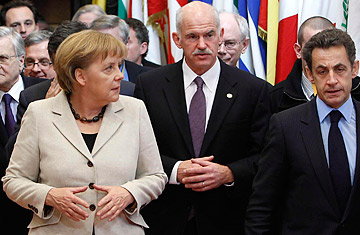
Germany's Chancellor Angela Merkel, Greece's Prime Minister George Papandreou and France's President Nicolas Sarkozy leave the EU Council building after a meeting before an informal summit of European Union heads of state and government in Brussels February 11, 2010.
(2 of 2)
The spat between the two E.U. members is evidence of the how old enmities in Europe linger. Greek-German relations have been largely friendly in recent decades, the horrors of the war papered over by the benefits of modern European cooperation. Today, 2.5 million Germans flock to Greek beaches and ancient sites each year — more than from any other country except Britain — their euros welcomed by hoteliers and restaurant owners. But beneath the friendly hospitality, for Greeks, bitter memories of the war still linger.
During its 1941-1944 occupation of Greece, Germany diverted Greek crops to their own troops, sparking a famine in Athens. In all, an estimated 250,000 people across the country died of starvation. Greek guerrillas waged a fierce and dedicated resistance against the occupiers, but their bravery was countered by a brutal policy of reprisal killings. Much of the country's infrastructure was destroyed and Greece's old and venerable Jewish community was virtually eradicated.
Vassilis Tsimpidis, a Greek dockworker who protested this week against government austerity measures, echoed the sentiments of many Greeks when he said Greece's modern problems could be traced to German's wartime sins. "German people believe bad things about Greeks, but we want to remind the German people that they destroyed Greece in the Second World War," he said. "We haven't had a good life the last 40 or 50 years because of the war." Using a figure widely brandished in Greece as an estimate of Germany's war-related debt to the country, he called for Germany to "give us 70 billion to pay us for the war. That would solve all our problems."
German taxpayers, though, aren't buying that argument. In an open letter published in a Greek newspaper, German journalist Walter Wullenweber of Stern Magazine compared Greece to an ungrateful child and Germany to an aunt who is never thanked for her gifts. He calculated that if all the aid Germans have given Greeks was added up, since 1981, Germans have given each Greek $12,200. In return, Wullenweber complained, Greeks swindle the European Union and retire early. "You are by far our most expensive friend," he wrote.
Greek Prime Minister George Papandreou, who is headed to Berlin on March 5, has tried to dampen down talk of reparation claims and said raising the issue now could be seen as "a sign of weakness and an effort to evade our responsibility." For now, the feud is merely dinner table bickering. But issues of money have a way of straining otherwise happy families.
